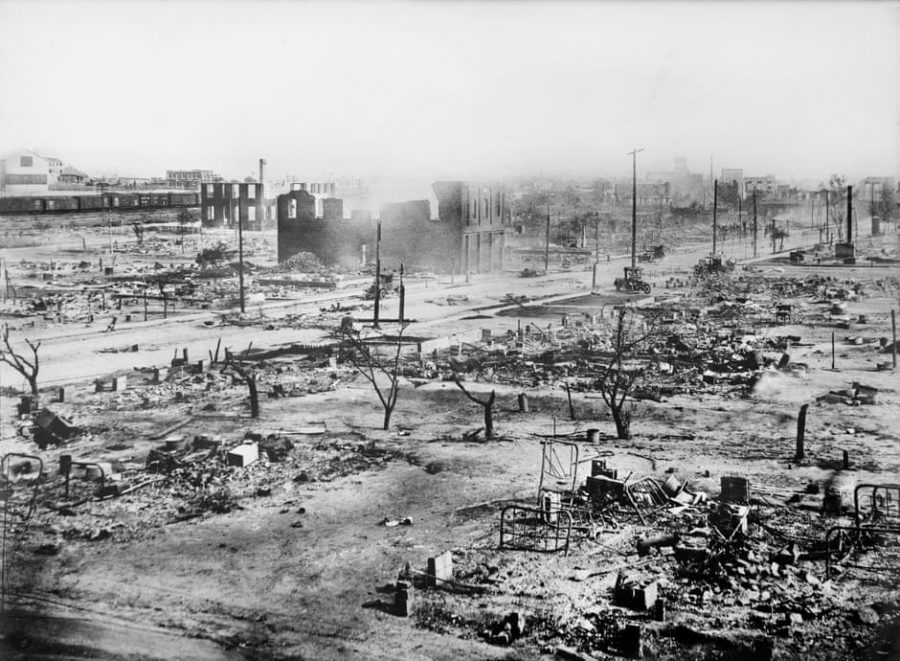100 Years Since the Tulsa Massacre: What Does President Biden Plan To Do?
June 4, 2021
May 31 and June 1 marked a century since one of the worst racial massacres in U.S. history. In 1921, Tulsa, Oklahoma, white mobs, many of whom were deputized with weapons given by city officials, burned Black Wall Street to the ground, murdering as many as 300 Black people, destroying 35 blocks of the Greenwood District, and looting 1,000 homes and businesses within 24 hours.

The Greenwood District of Tulsa became one of the first communities in the US with thriving Black entrepreneurial businesses. The town was founded by descendants of slaves and became a harbor for Black people in a nation highly segregated under Jim Crow laws.
Alicia Odewale, an archaeologist at the University of Tulsa, told CNBC that Tulsa city officials attempted to cover up the massacre by targeting the blame towards Black people by “calling the massacre a riot,” and “blaming the Black community for what went down.”
In the weeks after the attack, Tulsa’s chief of police ordered his men to go to the photography studios in Tulsa and to confiscate all pictures taken during the massacre.
After the massacre occurred, the Black community stayed silent in fear of another massacre like this one taking place.
“You are seeing the perpetrators walking freely on the streets,” Odewale told MSNBC. “You are in the Jim Crow south, and there are racial terrors happening across the country at this time. They are protecting themselves for a reason.”
According to MSNBC, many of the survivors of the attack didn’t tell their children or grandchildren of their horrible memories.
Scott Elsworth, a professor of Afro American and African studies at the University of Michigan, who wrote “The Ground Breaking,” a novel about the Tulsa massacre, says he knew descendants of survivors in their 40s or 50s.
“The silence is layered just as the trauma is layered,” Odewale says. “The historical trauma is real and that trauma lingers especially because there’s no justice, no accountability and no reparation or monetary compensation.”
President Biden met with multiple survivors of the masacre and announced the new steps his administration plans to take in order to fix the racial wealth gap. According to CNN, the poverty rate for Black Americans is double that of white Americans.
According to a report written and published by CNN, here are some of the actions intended to improve the racial wealth gap and address racial inequality:
-
- “Create a $10 Billion community revitalization fund”– This fund targets economically under-served areas and supports community-lead civic infrastructure projects that develop neighborhood facilities, strengthen vacant land and buildings, spark new economic growth locally, provide additional services, promote civic engagement and build community wealth.
- “Invest in transportation services”– President Biden hopes to establish a total of $15 billion in grants that would target neighborhoods in which people have been cut off from their jobs, schools, and businesses because of “previous transportation investments.” This funding would support planning, removing and modifying infrastructure that would create barriers in communities.
- “Increase affordable housing”– President Biden is calling for a “Neighbor Homes Tax Credit,” which would attract private investment in the development of affordable housing for low and moderate income buyers/owners.
- “Expand housing choices”– The President is asking lawmakers to establish a $5 billion grant program for jurisdictions that take steps to eliminate land-use and zoning barriers to produce affordable housing and expand housing choices for people with low or moderate incomes.
- “Invest $31 billion to support minority-owned small buisnesses”– As mentioned in the title, Biden wants to provide $30 billion to the Small Business Administration to “increase access to capital for the smallest companies, develop new loan products to support small manufacturers and businesses that invest in clean energy and launch a Small Business Investment Corporation to make early stage equity investments, placing a priority on small firms owned by socially and economically disadvantaged individuals.”
- “Combating house discrimination”- The President is charging Secretary of Housing and Urban Development Marcia Fudge with leading a new interagency initiative that addresses inequity in home appraisals. This effort will “carry out potential enforcement under fair housing laws, regulatory action, and the development of standards and guidance in partnership with industry and state and local governments.” This agency will also “publish two rules aimed at comparing practices that contribute to systemic inequality.”
- “Direct federal contracts to small businesses”- Biden’s goal is to increase the share of contracts going to small and disadvantaged–many of which are minority-owned– by 50% by 2026. According to CNN, President Bide can “direct federal agencies to conduct outreach to smaller businesses and reduce barriers that exist for them to compete in federal contracts.” It’s not certain whether or not he will need Congress to pass legislation that alters some of the rules.



